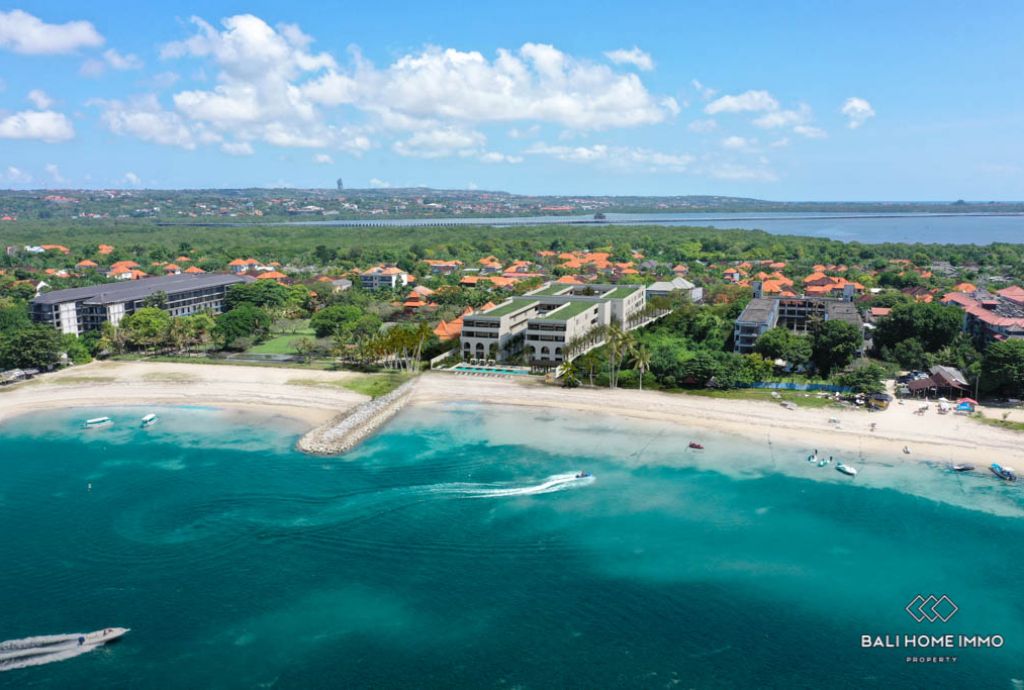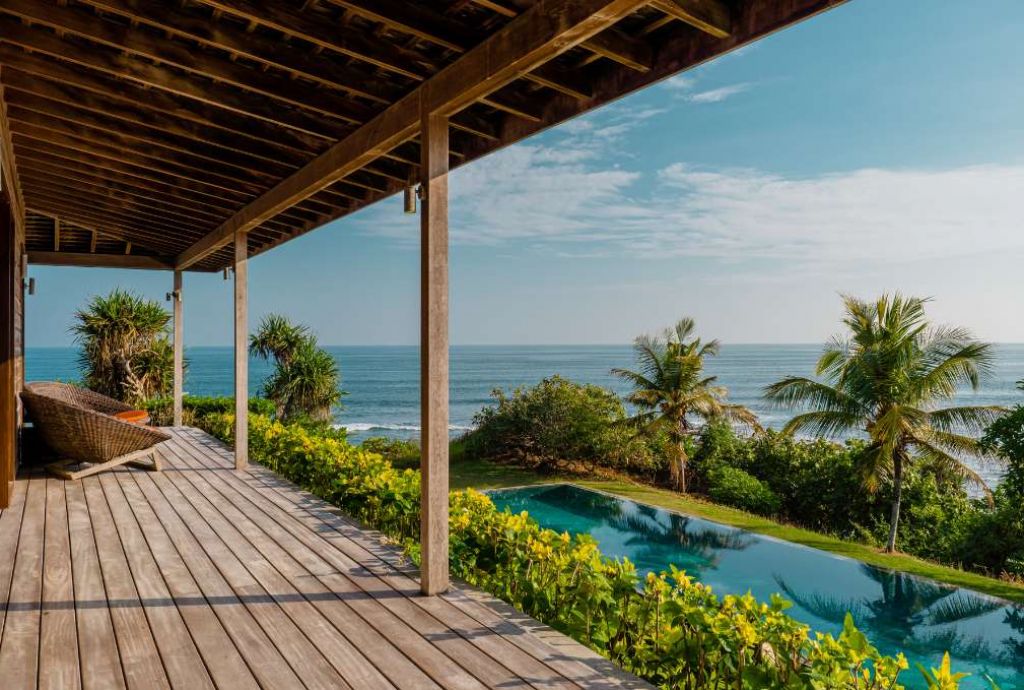
A Villa Like No Other – Sculpted Elegance with a Spiraling Masterpiece

Bali is a land where architecture and nature intertwine, and nowhere is this more evident than in this stunning villa tucked between the vibrant energy of Canggu and the refined charm of Seminyak. With 1,050 square meters of fluid design, this six-bedroom retreat is more than a home—it is a sanctuary of movement, light, and balance.
Every element of this villa is a conversation between form and function. It does not impose itself on its surroundings; instead, it blends, absorbs, and echoes the landscape. Sunlight seeps through perforated walls, casting playful shadows that shift with the passing hours. Glass doors erase boundaries, allowing nature to become part of the interior narrative. Hand-polished concrete and raw textures ground the space, evoking both permanence and flow. This is not merely a residence; it is a sculpture in which life unfolds.
A Pool That Reflects More Than the Sky
The swimming pool stretches along the villa’s heart, not as a feature, but as a presence. It mirrors the sky by day, an endless sheet of blue dissolving into tropical greens, and by night, it transforms into a luminous corridor, flickering under the soft glow of lanterns. Designed as a seamless extension of the living space, the water laps gently against built-in seating nooks, blurring the line between architecture and the elements. There is no distinction here—no separation between the human-made and the organic. The pool is not simply a place to swim; it is a liquid threshold between serenity and movement.
A Staircase That Spirals Toward the Sky

Suspended like a sculpted ribbon in space, the grand staircase is an ode to motion. It does not ascend—it flows. The curves are effortless, rising from the ground floor in a slow, deliberate twist, guiding the eye upward, inviting exploration. Light dances along its smooth surfaces, casting shifting tones that change with the time of day. It is both functional and poetic, a quiet centerpiece that redefines the concept of transition within the home. To walk up these steps is not merely to move between floors—it is to experience the villa’s rhythm, to feel its pulse beneath your feet.
The heart of the home
At the heart of this sanctuary, a dining table stretches under the warm embrace of golden pendant lights. Crafted from solid wood, its surface bears the traces of its origin—subtle grains, natural imperfections, a whisper of the forest from which it came. The ceiling above, a composition of rich wooden beams, cocoons the space, creating an intimate atmosphere. This is not just a dining area; it is a place where meals unfold as stories, where laughter lingers long after the plates have been cleared. Here, dining is not a routine but a ritual, an unhurried moment of connection within a home that honors the art of presence.
A Cinema Room Wrapped in Moroccan Dreams
Step inside the villa’s private cinema, and the outside world dissolves. Low-slung sofas invite you to sink in, while deep jewel tones and soft, layered textiles envelop you in a cocoon of indulgence. Inspired by Moroccan aesthetics, this space is not merely a room—it is an escape. Flickering lanterns cast intricate patterns on the walls, and plush cushions beckon for long evenings of storytelling, whether through the silver screen or whispered conversations. This is not just about entertainment; it is about immersion, a retreat into sound, image, and texture.
Ensuite Bedrooms That Speak in Tones of Tranquility
Every bedroom in this villa is an intimate dialogue between comfort and design. Each space, unique in its expression, is a sanctuary framed by soft linen drapes and floor-to-ceiling windows that filter in the golden light of the Balinese sun. The ensuite bathrooms are extensions of this tranquility, featuring smooth stone soaking tubs that feel like they have been carved from the earth itself. In the quiet of these spaces, time slows. The outside world feels distant. Here, sleep is not just rest—it is renewal, an invitation to wake up to yet another day in paradise.
This villa is more than an address. It is a philosophy, a testament to what happens when architecture does not compete with nature but instead converses with it. Every line, every texture, every shadow has been considered, not as a static element, but as a living part of the experience. This is not a home that demands attention. Instead, it invites you to notice—to observe how the light moves, how the air shifts, how silence settles into the corners of the space.
To walk through this villa is to step into a story still being written, one where luxury is not defined by excess, but by harmony. A space that does not simply exist in Bali but belongs to it, whispering the island’s timeless rhythm through every curve and contour.
Topic Categories
- All 280
- Uncategorized 6
- Bali Villa 20
- Bali Politics 6
- Bali News Update 7
- Bali Shopping 3
- Bali Tourism 34
- Bali Spirituality 2
- Bali Beauty and Fashion 0
- Bali History and Culture 23
- Bali Property Appraisal 1
- Bali Property Financing 3
- Bali Property Insurance 1
- Bali Property Management 5
- Bali Environment 10
- Bali Pets 2
- Bali Health and Wellness 6
- Invest in Bali 20
- Bali Local Services 5
- Bali Food & Dining 8
- Bali Home Improvement & Design 6
- Bali Legal Tips 7
- Bali Neighborhood Guides 11
- Bali Property Market Trends 13
- Bali Property Advice 56
- Bali Attractions 12
- FAQ 2
- Living in Bali 29
Topic Tags
- All 280
- Uncategorized 36
- Bali market report 1
- Villa for sale Canggu 4
- Villa for sale Uluwatu 4
- Bali Rentals 1
- Buying Process 6
- Labuan Bajo 0
- Bali Hospital 3
- Bali School 3
- Bali Beach 7
- Co-working Space 3
- Petitenget 1
- Australia 0
- China 2
- Bali Wedding 1
- Bali Flights 4
- Retire in Bali 4
- Nyepi 2
- Bali Villa Sale 18
- Bali Visa 4
- Bali Travel 23
- Villa Rental 7
- Airbnb 0
- PT PMA 3
- Bali Zoning Law 1
- Bali Tax 3
- Bali Property 50
- Double Six 0
- Sunset Road 0
- Nyanyi 1
- Legian 1
- Beach Club 4
- Oberoi 0
- Batu Bolong 3
- Batu Belig 0
- Business 2
- Legal 10
- Investment 31
- Tourism 44
- Travel 12
- Jimbaran 4
- Denpasar 2
- Seseh 2
- Eid al Adha 1
- Ascension Day 0
- Easter 0
- Vesak 0
- Islamic New Year 0
- Eid al-Fitr 1
- International Labor Day 0
- Independence Day 2
- Day of Silence 0
- Galungan Day 1
- Valentine 2
- Christmas 4
- New Year 4
- Lunar New Year 2
- Bali Market Trends 12
- Bali Art & Culture 18
- Bali Home Design 9
- Bali Health & Wellness 6
- Bali Food and Dining 10
- Bali Pets 3
- Bali Lifestyle 25
- Rice Field Front 1
- Jungle View 1
- River Front 0
- Rice Field View 3
- Ocean View 4
- Private Pool 0
- Fix and Flip 1
- Fixer-Upper 0
- Hotel & Resort 1
- Guest House 0
- Street Front 0
- Residential Zone 0
- Touristic Zoning 0
- Freehold 4
- Long Lease 7
- Short-Term 1
- Minimalist Villa 0
- Luxury Villa 7
- Turnkey Villa 3
- Residential Complex 0
- Exclusive Listing 0
- Off-Plan Property 4
- Studio 0
- Loft 0
- Apartment 8
- Villa 15
- Land 6
- Beachfront 3
- Family Villa 0
- Retirement Villa 1
- Investment Villa 22
- Digital Nomad 0
- Commercial Property 3
- Eco-friendly 0
- Contemporary Style 0
- Modern Style 1
- Javanese Style 0
- Rustic Style 0
- Traditional Style 0
- Bohemian Style 0
- Mediterranean Style 1
- Balinese style 1
- Nusa Penida 1
- Lombok 2
- Gili Island 3
- Amed 0
- Tabanan 1
- Cemagi 4
- Nusa Dua 6
- Sanur 4
- Umalas 4
- Berawa 5
- Ubud 3
- Tanah Lot 1
- Kuta 4
- Pererenan 5
- Uluwatu/Bukit Peninsula 15
- Seminyak 5
- Canggu 25
Relevant Articles you may like
About Bali Home Immo
Established in 2009, Bali Home Immo is the first real estate agency in Canggu with more than 7000 Bali properties listed in its database. Bali Home Immo (PT. Bali Properti Kontruksi) is a licensed property agency (SIUP-P4 certified) located in Bali, Indonesia and have been successfully operating as a trustworthy and reputable real estate agency with more than 13 years of experience. Long-standing partnerships and a committed, dedicated team are the driving force behind the work that takes place every day at Bali Home Immo.
As a member of the Real Estate Broker Association of Indonesia (AREBI), Bali Home Immo Property offers luxury real estate across the region to a local and international client base. Catering to a wide range of property requests, the team will ensure they can find a property, land or residential listing, to match each client’s personal requirements.
We have curated a wide selection of properties ranging from the land for sale, villas for sale and rent, as well as commercial space rental in Bali's most in-demand areas including Canggu, Seminyak, Pererenan, Umalas, and Uluwatu. Not only Bali, but our connection also reaches other popular destinations in Indonesia including Gili Islands, Lombok, Labuan Bajo, and more.
We also provide professional marketing services that will showcase the best of your Bali properties to more than +160k social media followers and maximise the potential to find buyers looking at villas for sale in Bali. With a thorough knowledge of the Bali property market inside-out, we deliver the most professional and data-driven valuation of your property at the most competitive price for your Bali properties.
Our expertise in the local market and extensive network affiliated with 93 local and international partners including Goplaceit.com, Rumah123, Kangaloo, Luxury Estate, and many more will also help you bring global exposure to your real estate investment and find your dream Bali property. Looking to buy villas for sale in Bali? Check out our online catalogue of Bali real estate and follow us on social media for updates.
Map
Send an Enquiry
Property Search
Sell/Rent My Property
Please fill this form and our listing agents will contact you to visit your property and/or give you a price valuation






